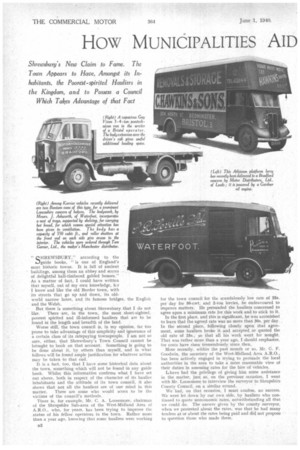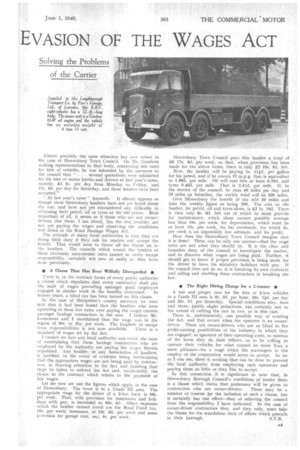How MUNICIPALITIES AID EVASION OF THE WAGES ACT
Page 28

Page 29

If you've noticed an error in this article please click here to report it so we can fix it.
Shrewsbury's New Claim to Fame. The Town Appears to Have, Amongst its Inhabitants, the Poorest-spirited Hauliers in the Kingdom, and to Possess a Council Which Takes Advantage of that Fact
(Right) Among Karrier vehicles recently delivered are two Bantam vans of this type, for a prominent Lancashire concern of bakers. The bodywork, by Messrs. J. Ashworth, of Waterfoot, incorporates a nest of trays, supported by shelving, for carrying hot bread, for which reason special attention has been given to ventilation. The body has a capacity of 350 cubic ft., and roller shutters at the front end on each side give access to the interior. The vehicles were ordered through Tom Gamer, Ltd., the maker's Manchester distributor.
" QHREWSBURY," according to the
t.../guide books, "is one of England's most historic towns. It is full of ancient buildings, among them an abbey and scores of delightful half-timbered gabled houses." As a matter of fact, I could have written that myself, out of my own knowledge, kr I know and like the old Border town, with its streets that go up and down, its old
world narrow lanes, and its famous bridges, the English and the Welsh.
But there is something about Shrewsbury that I do not like. There are, in the town, the most short-sighted, poorest spirited and ill-informed hauliers that are to be found in the length and breadth of the land.
Worse still, the town council is, in my opinion, far too prone to take advantage of this simplicity and ignorance of a certain class of its ratepaying townspeople. I am not so sure, either, that Shrewsbury's Town Council cannot be brought to book on that account. Something is going to be done about it, by others than myself, and in what follows will be found ample justification for whatever action may be taken to that end.
It is a fact, too. that I have some historical data about the town, something which will not be found in any guide book. Whilst this information confirms what I have set out above, both in respect of the character of its haulier inhabitants and the attitude of its town council, it also shows that not all the hauliers are of one mind in this matter. There are some who would scorn to be the victims of the council's methods.
There is, for example, Mr. C. A. Loosemore, chairman of the Shropshire Sub-area of the West-Midland Area of A.R.O., who, for years, has been trying to improve the status of his fellow operators in the town. Rather more than a year ago, knowing that some hauliers were working for the town council for the scandalously low rate of 25s. per day for 30-cwt. and 2-ton lorries, he endeavoured to improve matters. He persuaded the hauliers concerned to agree upon a minimum rate for this work and to stick to it.
In the first place, and this is significant, he was astonished to learn that the agreed rate was no more than 30s. per day. . In the .second place, following closely upon that agreement, some hauliers broke it and accepted or quoted the old rate of 25s.; so that all his work went for nought. That was rather more than a year ago, I should emphasize, for costs have risen tremendously since then.
More recently. within the past month or so, Mr. G. F. Goodwin, the secretary of the West-Midland Area A.R.O., has been actively engaged in trying to persuade the local authorities in the area to take a more reasonable view of their duties in assessing rates for the hire of vehicles.
Lhave had the privilege of giving him some assistance in the matter, just as, on the previous occasion, I went with Mr. Loosemore to interview the surveyor to Shropshire County Council, on a similar errand.
We had, on that occasion, I must confess, no success. We were let down by our own side, by hauliers who continued to quote uneconomic rates, notwithstanding all that we could do. The answer given by the county surveyor, when we protested about the rates, was that he had many tenders at or about the rates being paid and did not propose to question those who made them.
Almost precisely the same situation has now arisen in the case of Shrewsbury Town Council. On Mr. Goodwin making representations to that body, concerning fair rates for hire of vehicles, he was informed by the surveyor to the council that " . . several quotations were submitted for the hire of motor lorries and drivers at last year's rates, namely, 21 5s. per day from Monday to Friday, and 12s. 6d. per day for Saturday, and these tenders have been accepted."
" At last year's rates " forsooth. It almost appears as though these Shrewsbury hauliers have not yet heard about the war, and have not yet encountered ally difficulty in obtaining their petrol, oil or tyres at the old prices. Most important of all, it seems as if those who are not ownerdrivers (for there, I am afraid, lies the real trouble) are not yet paying the wages and observing the conditions laid down in the Road Haulage Wages Act.
The attitude of many local authorities is that they are doing their duty if they ask for tenders and accept the lowest. That would seem to throw all the blame on to the hauliers, The councils which award the tenders at these obviously uneconomic rates cannot so easily escape responsibility, certainly not now so easily as they have done previously.
• A Clause That Ham Been Wilfully Disregarded •
There is, in the contract forms of every public authority a clause which stipulates that every contractor shall pay the scale of wages prevailing amongst good employers engaged in similar work in the locality concerned. In 'former years, a blind eye has been turned on this clause.
In the case of Shropshire's county surveyor we were told that it had been found that the hauliers who were operating at these low rates were paying the wages current . amongst haulage contractors in the area. I believe Mr. Loosemore and I ascertained that the wage was in the region of 30s. or 35s. per week, The loophole of escape from responsibilities is not now available. There is a standard of wages set by the Act.
I cannot see how any local authority can evade the onus of ascertaining that those haulage contractors who are employed by the authority arc paying the wages therein stipulated. Any haulier, or any Association of hauliers, is justified, in the event of evidence being forthcoming that the appropriate wages are not being paid by contractors, in drawing attention to the fact and insisting that steps be taken to enforce the Act and, incidentally, the clause in the contract which relates to the payment of fair wages.
• Let me now set out the figures which apply in the case of Shrewsbury. The town is in a Grade III area. The appropriate wage for the driver of a 2-ton lorry is 56s. per week. That, with provision for insurances and holidays with pay, is increased to 60s. 6d. Other expenses which the haulier cannot avoid are the Road Fund tax, 10s. per week; insurance, at 12s. 6d. per week and some provision, for garage rent, say, 4s, per week. Shrewsbury Town Council pays this haulier a total of 26 17s. 6d. per week, so that, when provision has been made for the above items, there is only 22 10s. 6d. left.
Now, the haulier will be paying Is. Hid. per gallon for his petrol, and if he covers 12 m.p.g. that is equivalent to I.96d_ per mile. Oil will cost him at least 0.10d. and tyres 0.45d. per mile. That is 2.51d. per mile. If, in the service of the council, he runs 40 miles per day and 20 miles on Saturday, the weekly total will be 220 miles. Give Sgrewsbury the benefit of the odd 20 miles and take the weekly figure as being 200. The cost to the haulier, for petrol, oil and tyres alone, is 22 Is. I0d. There is then only 8s. 8d. left out of which he must provide for maintenance, which alone cannot possibly average less than 10s. per week, for depreciation, which must be at least 15s. per week, for his overheads, for which 5s. per week is an impossibly low estimate, and for profit.
How does the Shrewsbury Town Council imagine that it is done? There can be only one answer—that the wage rates are not what they should be, It is the clear and bounden duty of the council to investigate the matter, and to discover what wages are being paid. Further, it should get to know if ptoper provision is being made for the driver to have his statutory holidays with pay. If the council does not do so, it is breaking its own contracts and aiding and abetting these •contractors in breaking the law.
• The Right Hiring Charge for a 2-tonner • A fair and proper rate for the hire of 2-ton vehicles in a Grade III area is 6s. 3d. per hour, 53s. lfd. per day and 26s. 7d. per Saturday. Special conditions may, here and there, justify slight reductions, but certainly not to the extent of cutting the rate in two, as in this case.
There is, unfortunately, one possible way of evading the Act, and that occurs when the operator is an ownerdriver. There are owner-drivers who are so blind to the profit-earning possibilities of the industry, in which they are engaged, so ignorant of their operating costs, so careless of the harm they do their fellows, as to be willing to operate their vehicles for what cannot be more than a mere pittance—for a wage which the scavengers in the employ of the corporation would scorn to accept. So far as I can see, there is nothing that can be done to prevent the local authority from employing such operators and paying them as little as they like to accept.
In this connection it is significant to note that, in Shrewsbury Borough .Council's conditions of tender there is a clause which states that preference will be given to
contractors who are owner-drivers. There may be a number of reasons for the inclusion of such a clause, but it certainly has one effect—that of relieving the council from the responsibility I have indicated. In the case of owner-driver contractors they, and they only, must take the blame for the scandalous state of affairs which prevails in their borough. S.T.R.




























































